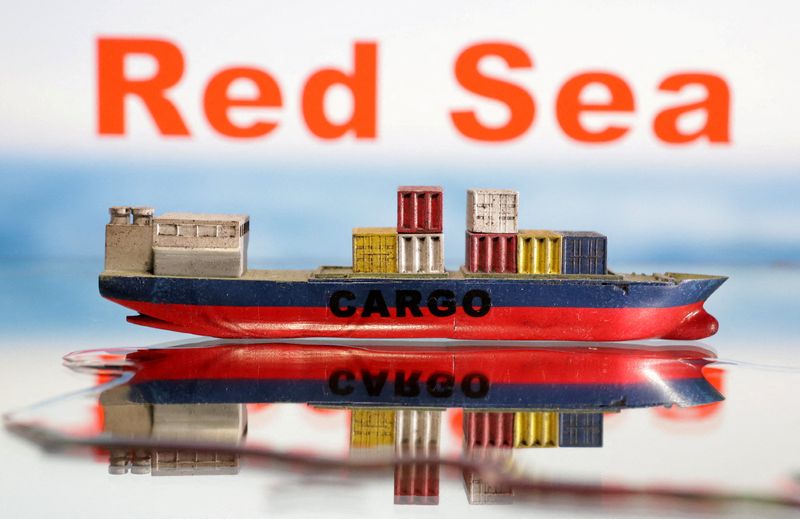By Robert Harvey, Natalie Grover and Ahmad Ghaddar
LONDON (Reuters) -At least six more oil tankers were steering clear of the southern Red Sea on Monday, as disruptions increase on the vital route for energy shipping in the wake of U.S.-led strikes against Houthi targets in Yemen.
Following the U.S. and British strikes, the U.S.-led Combined Maritime Forces (CMF) based in Bahrain on Friday warned all ships to avoid the Bab al-Mandab Strait at the south end of the Red Sea for several days, tanker body INTERTANKO said.
Prior to the strikes it had been mostly container ships which were avoiding the Red Sea, with oil tanker traffic largely unchanged in December.
But since the CMF's warning, a growing number of oil tankers are avoiding the region, increasing the potential for disruptions to oil supply via the Suez Canal in both directions.
Reuters on Monday counted six tankers that had altered their course, making a total of at least fifteen vessels to do so since the start of the strikes, ship tracking data from LSEG and Kpler showed.
The tankers Torm Innovation, Proteus Harvonne, and Alfios I appeared to have turned away from the Suez Canal in favour of the longer route around Africa's Cape of Good Hope for voyages to Europe and the U.S..
The Pacific Julia and STI Topaz are also heading straight for the Cape route.
The Octa Lune performed a U-turn in the northern part of the Red Sea on Jan. 12 and has returned to the Mediterranean with a Taiwan-bound cargo of naphtha.
Tankers tracked by Reuters on Friday that had diverted or paused have either taken the longer Cape route or paused in the Gulf of Aden or northern Red Sea.
Tanker owners including Torm, Hafnia and Stena Bulk said they would avoid Bab al-Mandab from Friday, while Euronav (NYSE:EURN) reaffirmed its temporary suspension of transits through the Red Sea.
WATERBORNE OIL GLUT
The disruption is indirectly tightening the market by forcing up oil stocks on water by 35 million barrels, Citi analysts noted.
Oil prices gained 2% last week in response to the rising tide of conflict in the region, but the lack of direct impact on oil production could be limiting gains, according to analysts, as prices ticked lower on Monday.
The strikes last week across Yemen against Houthi forces came in retaliation for months of attacks on Red Sea shipping.
The Houthis said on Monday that their attacks would continue despite the U.S. strikes, and struck a U.S.-owned dry bulk vessel carrying steel products with an anti-ship ballistic missile in the Gulf of Aden on Monday.
Houthi militants have been targeting commercial vessels since late last year in attacks which the group says are in support for Palestinian group Hamas in its war with Israel in the Gaza Strip.

Those incidents have been concentrated on the Bab al-Mandab Strait, southwest of the Arabian Peninsula.
Regional shipping tensions also spread to the other side of the peninsula last week when Iran seized a tanker south of the Strait of Hormuz, another key shipping corridor.